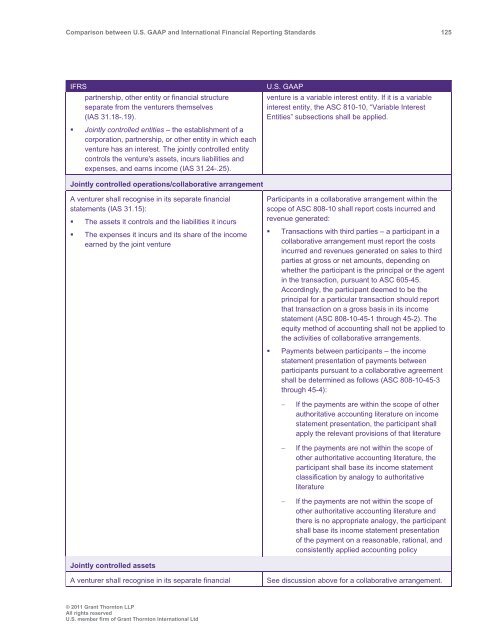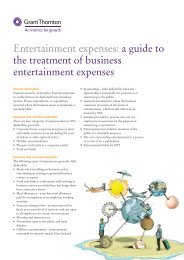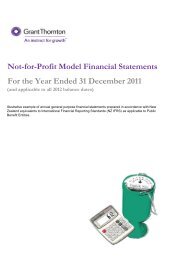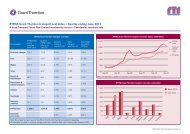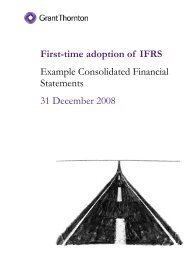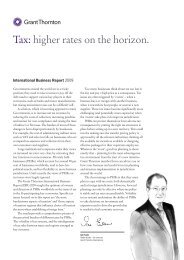Comparison between U.S. GAAP and International ... - Grant Thornton
Comparison between U.S. GAAP and International ... - Grant Thornton
Comparison between U.S. GAAP and International ... - Grant Thornton
You also want an ePaper? Increase the reach of your titles
YUMPU automatically turns print PDFs into web optimized ePapers that Google loves.
<strong>Comparison</strong> <strong>between</strong> U.S. <strong>GAAP</strong> <strong>and</strong> <strong>International</strong> Financial Reporting St<strong>and</strong>ards 125<br />
IFRS<br />
partnership, other entity or financial structure<br />
separate from the venturers themselves<br />
(IAS 31.18-.19).<br />
• Jointly controlled entities – the establishment of a<br />
corporation, partnership, or other entity in which each<br />
venture has an interest. The jointly controlled entity<br />
controls the venture's assets, incurs liabilities <strong>and</strong><br />
expenses, <strong>and</strong> earns income (IAS 31.24-.25).<br />
U.S. <strong>GAAP</strong><br />
venture is a variable interest entity. If it is a variable<br />
interest entity, the ASC 810-10, “Variable Interest<br />
Entities” subsections shall be applied.<br />
Jointly controlled operations/collaborative arrangement<br />
A venturer shall recognise in its separate financial<br />
statements (IAS 31.15):<br />
• The assets it controls <strong>and</strong> the liabilities it incurs<br />
• The expenses it incurs <strong>and</strong> its share of the income<br />
earned by the joint venture<br />
Participants in a collaborative arrangement within the<br />
scope of ASC 808-10 shall report costs incurred <strong>and</strong><br />
revenue generated:<br />
• Transactions with third parties – a participant in a<br />
collaborative arrangement must report the costs<br />
incurred <strong>and</strong> revenues generated on sales to third<br />
parties at gross or net amounts, depending on<br />
whether the participant is the principal or the agent<br />
in the transaction, pursuant to ASC 605-45.<br />
Accordingly, the participant deemed to be the<br />
principal for a particular transaction should report<br />
that transaction on a gross basis in its income<br />
statement (ASC 808-10-45-1 through 45-2). The<br />
equity method of accounting shall not be applied to<br />
the activities of collaborative arrangements.<br />
• Payments <strong>between</strong> participants – the income<br />
statement presentation of payments <strong>between</strong><br />
participants pursuant to a collaborative agreement<br />
shall be determined as follows (ASC 808-10-45-3<br />
through 45-4):<br />
<br />
<br />
<br />
If the payments are within the scope of other<br />
authoritative accounting literature on income<br />
statement presentation, the participant shall<br />
apply the relevant provisions of that literature<br />
If the payments are not within the scope of<br />
other authoritative accounting literature, the<br />
participant shall base its income statement<br />
classification by analogy to authoritative<br />
literature<br />
If the payments are not within the scope of<br />
other authoritative accounting literature <strong>and</strong><br />
there is no appropriate analogy, the participant<br />
shall base its income statement presentation<br />
of the payment on a reasonable, rational, <strong>and</strong><br />
consistently applied accounting policy<br />
Jointly controlled assets<br />
A venturer shall recognise in its separate financial<br />
See discussion above for a collaborative arrangement.<br />
© 2011 <strong>Grant</strong> <strong>Thornton</strong> LLP<br />
All rights reserved<br />
U.S. member firm of <strong>Grant</strong> <strong>Thornton</strong> <strong>International</strong> Ltd


